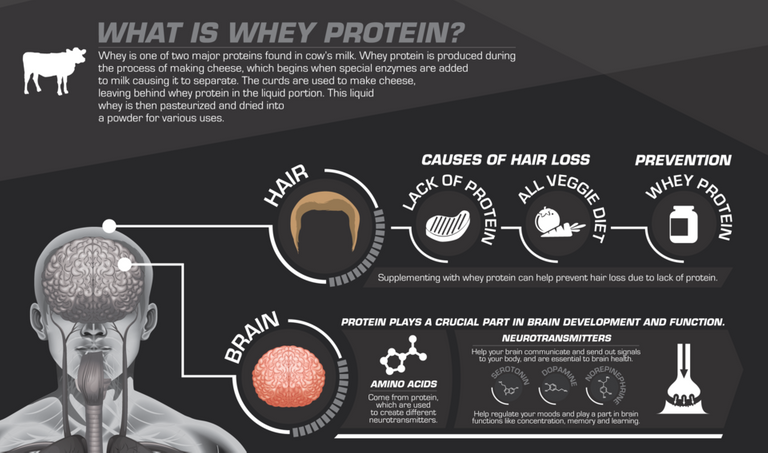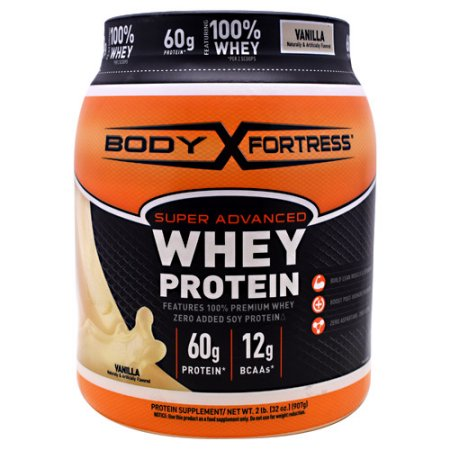WHEY PROTEIN- THE UNPOPULAR BUT MORE SIGNIFICANT DIARY PROTEIN

InfoGraphic

Raw Whey Protein
Protein comes in several sources, from plants, animals and could be fabricated. There is also a seafood protein source, though iodine and calcium are the principal minerals alongside. Animals have more protein than the plant in the sense that, the meat of a cow and chicken are proteinous so is their Milk and Egg Respectively compared to only a few plants (soybeans, peas, etc.)
In my blog today, I will be elaborating on protein from the Diary product; "Milk" which contains Casein and Whey, the latter plays essential roles in Brain Development and Functionality. Like every other food supplement; one works better and nourishes the body with the help of others, therefore protein without other nutrients might not be as fantastic as it uses to be.
What Exactly is Whey Protein?
From Diary product, in Cow Milk; Whey is one of the two major proteins found in it alongside Casein, which is manufactured during Cheese making process and is initiated by the addition of special enzymes which causes separation during this process that also produces curds, the Curds is then used to produce Cheese which is extracted leaving behind the Whey protein in liquid portion. Afterward, the liquid whey is pressurized and dried then turned solids/powder and used for various means.

Whey Protein Food Supplement
Whey protein is divided into three primary types; WPC- Whey Protein Concentrate, WPI- Whey Protein Isolate and WPH- Whey protein Hydrolysate and it consist of all the 9 essential amino acids and is low in lactose content; these features make it more suitable and term as the "Complete Protein" which is in stores Worldwide as food supplements.
BENEFITS AND USES
Whey protein has many therapeutic properties and there are ongoing researches to unlock the full potential of this class of protein and it's possible hazards. Below are some of its benefits to the human body.
BRAIN
In Brain Development, protein is crucial. Whey protein could help create healthy Neurotransmitters which helps concentration and sends fast signals to the entire body for reflex actions. It also helps to regulate moods, learning capabilities, and Memory.
THE HUMAN HAIR
Lack of protein could result in hair loss, too much vegetable diets could result in this as well. Whey as a supplement to food or main helps to prevent this defect and helps grows lost hairs with adequate and accurate consumption.
BALANCED CHOLESTEROL LEVEL AND WEIGHT LOSS
It also helps in combating overweight and high cholesterol. In a study of 158 subjects grouped into two, those who were placed on Whey Protein "shed more body fat with high preservation of lean muscle than the subjects placed on control beverages". Whey protein helps in weight loss with HIV positive patients.
In another study which involves giving Whey supplements to 70 overweight people for 12 weeks, measuring their insulin and lipid levels. It was discovered that there was a notable decrease in total Cholesterol and LDL Cholesterol at 12 weeks on the dot compared to test subjects under Casein-
The British Journal of Nutrition
ANTI-CANCER ABILITY AND ASTHMA IMMUNITY
In cancer treatment, Whey Protein showed a very promising result, although more research and studies are needed. Out of a group of children with asthma, Whey protein could improvise Response to treatment and aid strong immunity. For Example;
Children with asthma who were supplemented with 10gram Whey protein twice daily for a month had an improved Immune Response-International Journal of Food Science and Nutrition
HELPS WITH CARDIOVASCULAR DISEASES AND BLOOD PRESSURE
Studies have shown that whey as a supplement in beverages drastically reduces Blood pressure in hypertensive patients and the risk of having a stroke and other heart diseases reduced.
SIDE EFFECT
Just like every other thing if taken in excess, there is always a repercussion. Taking Whey Protein (supplements or main course) in high quantity could result in fatigue, headache(a migraine), cramps, loss of appetite, pains in the stomach, and nausea. No natural equivalent of whey protein, hence it should be consumed moderately as advised by professional Nutritionist.